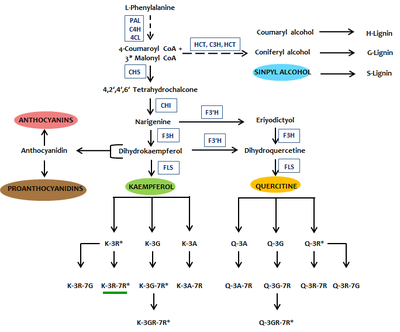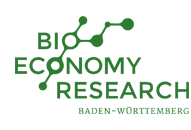Cross talk between lignin synthesis and flavonoid formation in Miscanthus

Developing and using biomass not only as a renewable source for bio-energy but also for new bio-materials can provide a solution to major issues of global warming, soaring fossil fuel costs, and environmental pollution. Lignocellulose, which is the main component of the plant cell wall, is the most abundant renewable resource and can be converted into bio-ethanol and other liquid biofuels as well as transformed into platform chemicals for novel bio-materials.
While lignin is considered to be the major physical barrier to cellulase digesting cellulose from lignocellulosic biomass, it also provides an interesting starting material for new bio-materials. Thus, lignin content and/or composition directly impact utilization options of lignocellulose within the bioeconomy.
In higher plants, the biosynthesis of lignin monomers (monolignols) and flavonoids (an important and diverse class of secondary metabolites; Fig.1) depend on the phenylpropanoid metabolic pathway, with the amino acid L-phenylalanine being the common precursor. Both lignin biosynthesis and flavonoid formation are developmentally regulated and also respond to environmental stress factors.
The aim of this project is to explore the cross talk between flavonoid synthesis and lignin synthesis under different environmental conditions (N availability, UV-B stress etc.) and in diverse genotypes of Miscanthus. In both synthetic pathways, transcription factors of the R2R3_MYB family are key regulators. Therefore, this project will profit from intense collaboration with TP74.
Deepening our understanding of how this cross talk is regulated will provide new insight into the dynamic control of lignification. Furthermore, the gained knowledge may be instrumental to developing new breeding strategies for Miscanthus.
Project title | Cross talk between lignin synthesis and flavonoid formation in Miscanthus |
| Institution | University of Heidelberg, Center for Organismal Studies (COS) |
| Research group | Prof. Thomas Rausch, Wan Zhang |
| Funding | ChinaScholarship Council |
